THE CAREGIVER’S GUIDEBOOK
A Practical and Spiritual Companion for Caregivers
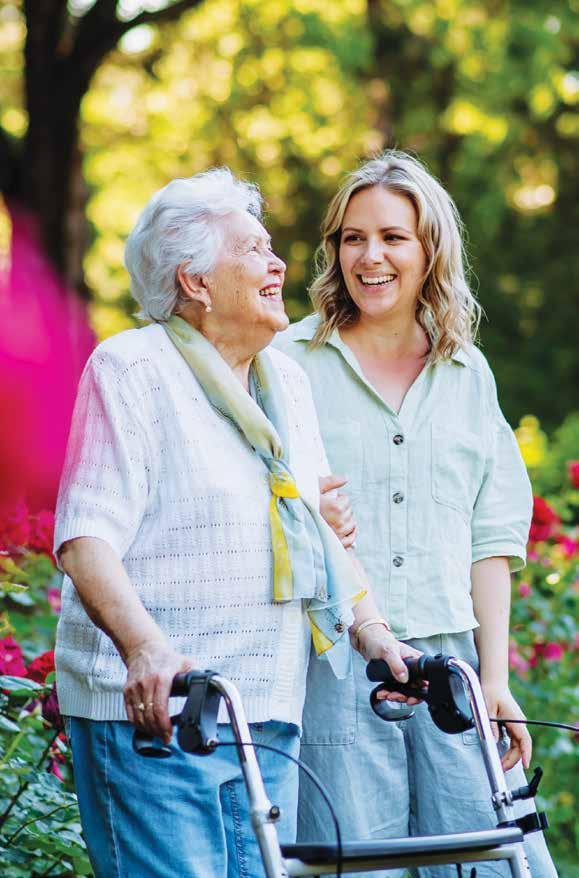





NORTH CAROLINA BAPTIST AGING MINISTRY
NCBAM
P.O. Box 338
Thomasville, North Carolina, 27361
www.ncbam.org | ncbam@bchfamily.org
877.506.2226
©2024, North Carolina Baptist Aging Ministry, a ministry of Baptist Children’s Homes of North Carolina. No part of this material may be reproduced, stored in a retrieval system, or transmitted in any form or by any means (mechanically, electronically, recording, etc.) without the prior written consent of North Carolina Baptist Aging Ministry.
Scriptures taken from the Holy Bible, New International Version®, NIV®. Copyright © 1973, 1978, 1984, 2011 by Biblica, Inc.™ Used by permission of Zondervan. All rights reserved world-wide. www.
zondervan.com The “NIV” and “New International Version” are trademarks registered in the United States Patent and Trademark Office by Biblica, Inc.™
The Caregiver’s Guidebook is part of NCBAM’s CareAbleTM Curriculum.
Printed in the USA. All rights reserved.
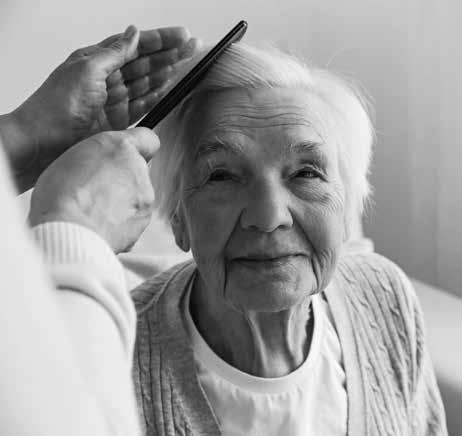
This handbook was written for you, dear caregiver. We at North Carolina Baptist Aging Ministry want you to know you are not alone. We hope this guidebook will help you to find strength, grace, and peace in your caregiving journey.
Throughout, we refer to you as “Caregiver”—a beautiful word that embodies nurture, support, dedication, selflessness, and grace.
We refer to those receiving your care as “care receiver,” “family member,” “those under care,” or “loved one.” We recognize that relationships between caregivers and care receivers differ and that all caregivers may not identify with these terms. We understand you may be caring for a loved one who has been unkind to you. We honor all caregivers for their capacity for empathy and service amidst life’s challenges.

If you have ever felt overworked and exhausted, or found yourself wondering who cares for you in your caregiving journey, this guidebook is for you!
You will find information to help you understand what the person you care for is going through, practical day-to-day suggestions, where help can be found, and spiritual guidance to help you care for yourself as you care for your loved one.
We at NCBAM have seen caregivers’ commitment to their loved ones. We have also heard hopelessness in their voices, witnessed their exhaustion, and seen worried looks on their faces—wondering if they are doing enough.
Our wish is for you to find hope and to know that NCBAM can help you in your caregiving journey. May every minute you spend in this book be encouraging to you.

Anita Davie, Far West Regional Director for NCBAM, led the NCBAM team in the development of this book. Prior to joining NCBAM in 2014, Anita served as director of Madison County’s Department of Social Services, as adult services representative for North Carolina’s Division of Social Services, and as the director of the Area Agency on Aging for the High Country Council of Governments.

Perhaps the most stressful work and the most rewarding work is that of a caregiver. It is no secret that providing care for a person with a functional disability or a chronic condition exacts a heavy toll on the caregiver. The caregiver is often referred to as the second victim.
Caregiving involves many challenges. A caregiver may be required to master new skills—skills you may have no desire to learn. You may need to develop new ways of relating to the family member for whom you care. Tough decisions must be made.
And—caregiving does not happen in a vacuum. You have other commitments: work, children or grandchildren, or another disabled person to care for; and maybe you have your own health or relationship issues.
Most caregivers at some point ask themselves, “What did I do to deserve this?,” or “HowcanIgeteverythingdone?, Whywon’tothers help?, Whydidthishappentome?,” or “Who cares about me?, “Does God care about me?”
What do caregivers look like? Are they a person caring for an older spouse or an adult child with special needs? A working woman in her sixties caring for a parent? Or a frail person caring for a very frail person? The truth is that a caregiver can be any one of us. It can be a sudden change in a life situation or it can seem like a lifetime of work. And, typically, a caregiver provides care without any outside help.
For the purposes of this handbook the word caregiver refers to a person providing care to a family member or loved one who is physically, mentally or emotionally disabled and needs help with activities of daily living. The word care refers to assisting or helping with the activities of daily living. Activities of daily living include: bathing, dressing, getting in and out of bed or a chair, walking, using the toilet, and eating.
To be a caregiver you do not have to provide 24/7care, but some do. Keep in mind that many caregivers are still employed and trying to balance work and caregiving. A caregiver may live with the loved one, next door, in the same community, or in another state.
Caregivers provide assistance with one or more of the following tasks or activities:
• personal care: assistance with toileting, bathing, dressing, eating, or moving around
• taking medication(s)
• household chores
• meal preparation
• laundry
• shopping
• schedules and appointments
• researching and acquiring services and resources
• supervision to keep the loved one safe
• helping someone manage their behavior
• managing finances
• other activities as required
1. The relationship between the caregiver and the loved one can (and often does) change when caregiving becomes necessary.
2. Both the caregiver and the loved one may grieve their loss.
3. Although change does occur, this does not mean that life is over or that an abrupt change in your day-to-day routine is required.
4. Caregivers can help identify ways or opportunities to maintain a sense of independence or purpose for the care recipient—including those with dementia.
5. When you allow your loved one to do some things for themselves, it helps them maintain a sense of dignity and allows you one less thing to do.
As you have read through, “Who Is a Caregiver,” you may have experienced feelings of fear, uncertainty, or even resentment. You may feel you have been plunged into a role you never expected and for which you do not feel prepared.
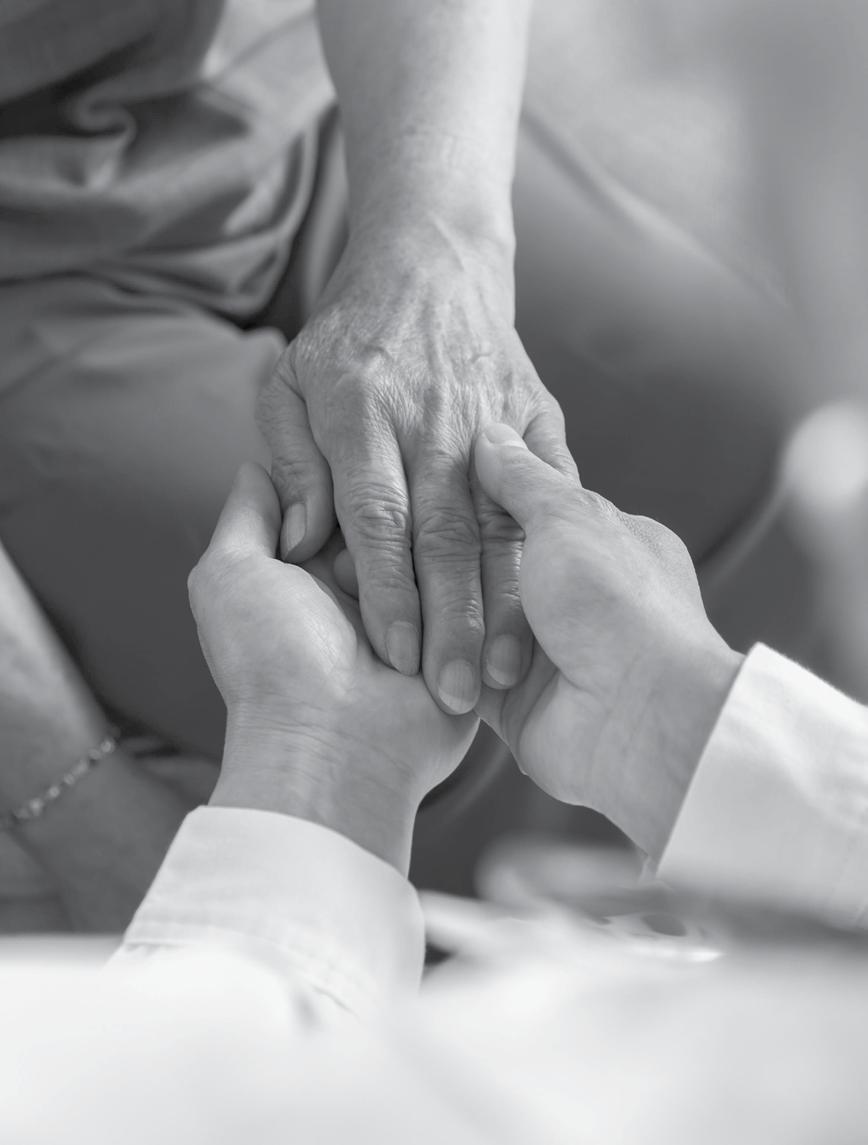
It may seem strange to mention rewards in connection with caregiving. Being a caregiver is challenging and stressful, but there are caregivers who also describe their role as meaningful and rewarding. The rewards of caregiving include:
• Finding joy. Sharing meals, taking a walk together, or appreciating a sunset can provide precious time together for talking, learning, laughing, and sharing the moment together. These memories will last.
• S elf-care. Learning to take care of yourself is not only okay; it is essential. Find ways to take care of yourself spiritually, emotionally, and physically. Learn to set boundaries. Learn that it is okay to ask for help.
• Opp ortunities to give back to the one you love, to heal a broken relationship, to say you are sorry before it is too late.
• New and lasting friendships. As you connect with others who face the same challenges, you have opportunity to learn from them as they learn from you.
• Learning new skills. You may learn to talk about your feelings and concerns. You may learn to be assertive and ask for help. You may find strengths you did not know you had.
Know that God will carry you through. Call out to Him. Know that He loves you and cares for you. Moreover, He is strong enough, He is all powerful and all knowing. Jesus told us: “Come to me, all you who are weary and burdened, and I will give you rest.”
– Matthew 11:28

What is the most difficult thing about being a caregiver for you? Think back prior to becoming a caregiver. What occupied your thoughts? Your time? Remember the fun you had, the rest you got, the things you enjoyed, and the dreams you had? What happened?
Caregivers have expectations placed upon them—in addition to the direct care they give. For example: communicating with others about or for your loved one—people such as doctors, family members, lawyers, bank employees, insurance agents, and even friends.
And while in the midst of caregiving, resentments and other family issues have a way of resurfacing.
It is important to identify challenges in order to see where you may need help.
• Adapting to changes
• Learning new skills
• Dealing with your own anger
• Dealing with loneliness or feelings of isolation
• No time for your “other life” or the things you used to do
• Too much to do. No time to rest.
• Emotions sometimes take over. You may feel emotionally drained or angry.
• Dealing with resentment
• Family issues
• Having to provide care to someone you do not like, or who has been mean or even abusive to you.

There are situations or times when you may face more than the usual difficulties in performing caregiving tasks. The following suggestions may help in coping and in caring for your loved one.
Your loved one may be restless, worried and unable to “settle down.” Agitated people may pace a lot. They may act aggressively toward others, lashing out verbally or physically, especially toward the caregiver. The cause of agitation may be pain or depression (and not knowing how to express it); soiled underwear or diaper; in a strange or unknown place; change in routine; too much noise or too many people around; feelings of being isolated or lonely, etc. Dealing with agitation is especially difficult when your loved one has dementia.
• If possible, remove yourself from the immediate situation by having someone else step into your place for a short period of time.
• Look for the cause of the agitation and deal with the cause before the behavior gets worse.
• Do not ignore the problem. It will only make matters worse.
• Reduce the noise or the number of people in the room.
• Provide a focused quiet time each afternoon for your loved one— perhaps sitting at a window with soft music in the background. Reduce household noises and activities as much as possible.
• As much as possible, keep a consistent routine.
• Limit caffeine, sugar, and junk food.
• Spend some time focusing on your loved one’s emotional needs. Like everyone, they have a need to feel respected; to have a sense of control and make choices; to feel needed; to have a purpose; and to feel connected to others with a sense of belonging.
• Most importantly, reassure your loved one. Speak calmly and listen to him or her compassionately.
Social isolation is good for no one. Among older adults, isolation can increase the risk of poor health practices, emotional distress, and neglect. For adults with dementia, less social contact can lead to a more rapid decline in memory and the ability to use reason.
• Schedule a walk partner for a stroll with your loved one.
• Have visitors spend time with your loved one.
• Include your loved one in a small group that meets on a regular basis. For example, a respite or a day-out program.
• Give household tasks to your loved one that he or she can accomplish. Praise them for their work.
• Continue in church activities and at-home devotions with your loved one.
• Provide activities that stimulate the brain such as puzzles, card games, exercise, or music.
The holidays bring mixed feelings for many people. This is even more true for caregivers, especially when caring for a loved one living with dementia. Realize that the holiday may place extra demands on you and your time.
• Celebrate the holidays important to you and your loved one. Family traditions are important.
• Understand that things may be different.
• Make holiday preparations together: such as, sending cards, wrapping gifts, decorating the house, sharing memories, etc.
• Ask family and friends to help. Let them cook, decorate, or even shop for gifts.
• If you feel you must (or want to) cook, simplify.
• Take a break from caregiving and ask someone to stay with your loved one while you get out of the house.
• Have a space where your loved one can rest or retreat to when people are visiting or when the noise level is high.
The following two suggestions apply when your loved one’s disability is dementia:
• Limit the number of people invited. Keep noises to a low level.
• Having the holiday meal at another person’s house may confuse the person experiencing dementia.
Like you, your loved one continues to have spiritual needs. Help him or her stay engaged with church. In addition to serving spiritual needs, this can help him or her feel connected to others and remember pleasant times. It is not unusual for someone experiencing later stages of dementia to still be able to sing or respond to words like faith, love, peace, angels, etc.
Keeping Yourself and Your Loved One Engaged Spiritually
• Involve your loved one in spiritual activities that he or she has known well; such as worship, Sunday School class, small groups, worship music, and praying.
• Tell folks at church if your loved one has dementia. This will help them know how to relate to your loved one.
• Have a set time at home for devotions and praying.
• Ask the pastor or an elder/deacon or an old friend from the church to visit.
• Always remember you serve a God stronger than anything. He will help you!
• Call on the church to give you respite.
• Some care recipients may want to carry their Bible throughout the day. Allow them to do so.

outreach provides a spiritual response to isolation and loneliness. One Hope includes the Hope Line, a toll-free number (866.578.4673) to call when you feel isolated or lonely. The Hope Line receives calls Daily, 9am – 9pm. Trained volunteers and staff respond with a friendly voice, a compassionate ear, and with hearts to pray with and for people.
Your loved one may start rummaging through cabinets, drawers, or closets. They may also hide things. For example, someone may hide their wallet under a mattress and days may be spent looking for it. They may also hide food. This behavior can be annoying or even dangerous. Remember, this behavior is part of the disease.
Steps to minimize this situation:
• Put dangerous or toxic products in locked areas.
• Keep trashcans covered or out of sight.
• Check trash containers before you empty them (in case something has been hidden or thrown away by accident).
• Store valuable items such as important papers, check books, mobile phones, credit cards, jewelry, or keys in a secure location.
• Search the house to learn where the care recipient hides things. Check there often.
• Some people with dementia wander. There are steps you can take to protect your loved one and prevent wandering.
• Make sure your loved one carries an ID or wears a medical bracelet.
• Notify neighbors and maybe the local police that he or she wanders.
• Keep a recent photo or video to assist the police in case your loved one wanders off.
• Keep doors locked. Consider adding a lock up high on the doors. (“Dementia Locks” can also be purchased.)
• Install cameras and alarms.
• Be knowledgeable about your loved one’s wandering. There will come a time when on-site, 24/7 supervision will be needed. Even then, you may turn your back and your loved one may race out the door.
Evenings can be hard for many people with dementia, which makes it more difficult on their caregivers. Some may become confused, restless or irritable in late afternoon. This restlessness is called “sundowning.” For example, they may want to go to bed in the late afternoon; refuse to go to bed when bedtime comes; or get out of bed all hours of the night.
The causes of “sundowning” remain unclear. However, certain factors seem to contribute; such as, being overly tired, low lighting, disruption in routine, poor sleep, medication, low energy at the end of the day, or maybe boredom.
Tips that may lessen “sundowning” symptoms
• Help your loved one get exercise every day, early in the day.
• Avoid naps during the day. If napping is a must, have nap time by early afternoon.
• Complete activities that use more energ y early in the day; such as bathing, other personal care items, shopping, etc.
• Establish a quiet, peaceful time in the late afternoon to help your loved one relax.
• Establish a bedtime routine with the same bedtime each night.
• Limit caffeine and sugar to mornings only. Avoid or reduce alcohol and nicotine.
• Use a night light in the hall, bathrooms and in the bedroom.
• By noticing what triggers “sundowning,” you can respond more appropriately.


Dementia is a general term for a decline in mental ability that interferes with daily life. Dementia has a wide range of symptoms affecting language, memory, communication, problem-solving, judgment, mood, and sensory perceptions. The most common type of dementia is Alzheimer’s Disease.
Contrary to popular belief, dementia is not a normal part of aging.
Caring for someone with dementia can be one of the most stressful experiences of all caregiving situations. Not only is the person’s memory impaired, but their ability to reason and understand become impaired as well. Behaviors will become challenging. There is emotional distress for both the loved one and the caregiver.
It is important to remember that the person is not behaving a certain way to irritate you: it is the decline in their mental ability. They are doing the best they can. Changes are taking place in the brain that affect their abilities and behaviors.
Suggestions that may help you provide care for someone with dementia.
• Rememb er they have a brain disease, and they are doing the best they can.
• Provide creative outlets for self-expression with music, art, writing, or a craft they used to enjoy; break the activity into smaller tasks.
• Have realistic expectations. Be observant and respect their limitations.
• Try to be relaxed, calm and gentle. They will pick up on your tension and get flustered.
• Do not rush the person.
• Minimize distractions to help the person focus.
• Avoid long sentences. Use short phrases and one-step instructions.
• Do not argue or correct. Arguing or correcting will only make things worse. Try distracting them.
• Try asking or suggesting instead of telling your loved one what to do.
• Help them maintain independence as much, and as long, as possible.
• Loses recent memory
• Has trouble finding words to say
• May stop talking to avoid making mistakes
• Has shorter attention span
• Has difficulty learning something new
• Asks repetitive questions
• Loses ability to manage money and pay bills
• Takes longer to do routine things
• Forgets to turn stove off when cooking
• Loses or misplaces things by hiding them in odd places
• Constantly searches for items, or hoards things of no value
• Forgets to eat sometimes or eats constantly
• The lack of good judgment creates safety issues when left alone; for example: wanders, gets lost, self-neglect, becomes a victim of exploitation
• Changes in behavior; lack of concern for hygiene, may need prompting
• May need help using the shower, finding the toilet
• Sleep pattern changes—may want to go to bed in midafternoon, and get up in the night to “work”
• Mixes up the identity of people, confused about who is who
• May refuse to go somewhere or do something expected
• More easily agitated
• Becomes paranoid: accuses spouse/caregiver of having an affair, stealing or hiding things from them
• May behave inappropriately: accuse, threaten, curse, hit, spit, or scream—especially at the caregiver
• Doesn’t recognize close family
• Speech becomes almost impossible to understand
• May forget to eat or how to swallow—may even forget that food is to be eaten
• Loses weight and skin becomes thin and tears easily
• Loses control of bowels and bladder
• May cry out, groan, or mumble loudly
• Becomes too weak to stand up or forgets how to walk
• Sleeps a lot
• Needs total assistance for all activities of daily living
Dementia has a wide range of symptoms affecting memory, language, communication, problem-solving, mood, sensory perception, and judgement. Symptoms progressively become more frequent and severe. Progression is usually gradual; moreover, not everyone progresses at the same pace. As symptoms continue, your loved one will become more and more dependent on you, the caregiver.
In closing this section on dementia, remember that as dementia continues, the person will become more dependent upon you for simple daily activities (feeding, bathing, dressing, etc.). Also, they will become unable to verbally communicate and to eat. Nonetheless, as a caregiver, you can take pleasure in helping the person living with dementia to enjoy whatever brings a smile to their face. Enjoy the good memories and the memories you are making now.
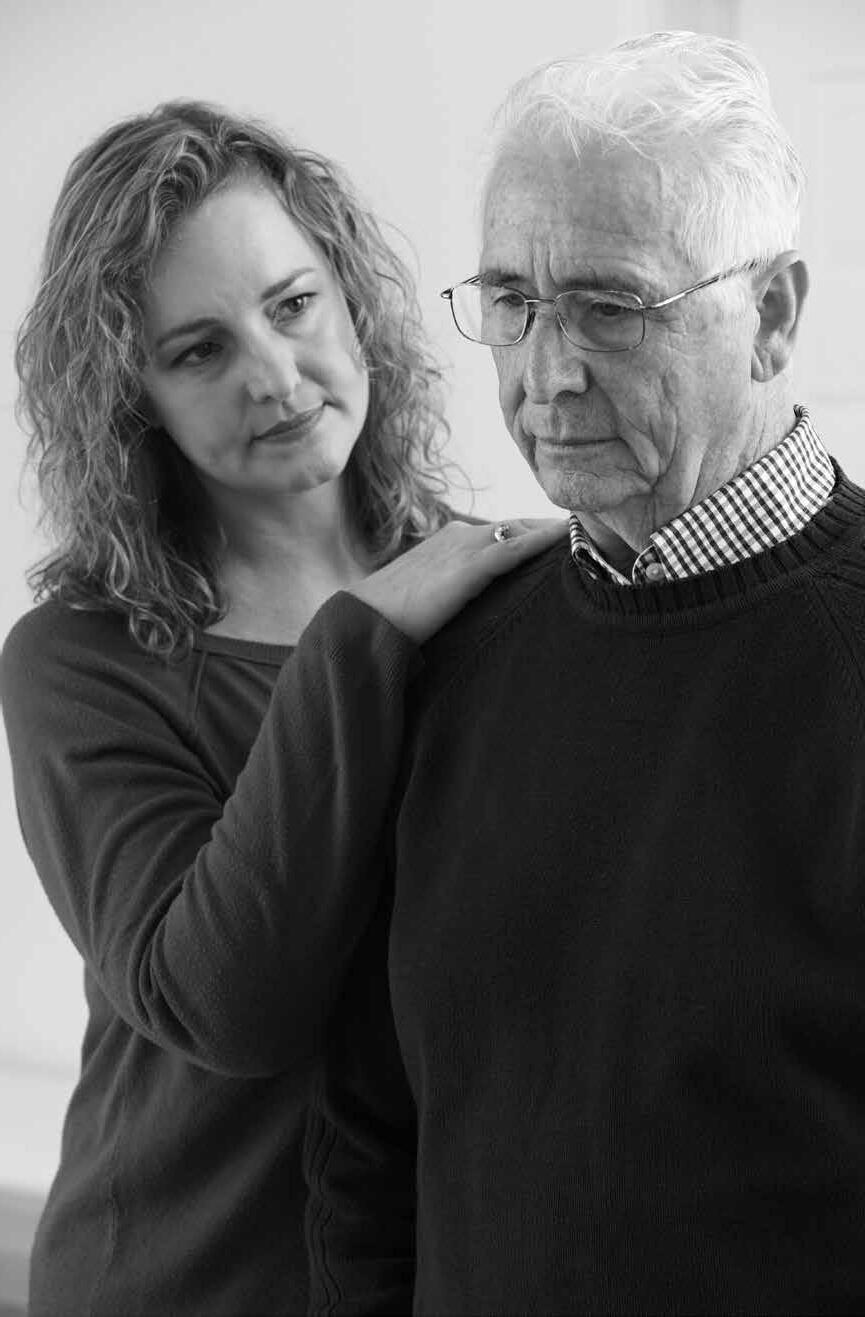

Caregiving can be stressful. A majority of caregivers report frequently experiencing high levels of stress. Below are some warning signs of too much stress. Ask yourself the following questions:
• Do you feel a loss of energy—tired and exhausted?
• Do you find yourself trying “to do it all”?
• Do you ignore your feelings or find that they are overwhelming?
• Do you have difficulties concentrating?
• Do you have difficulty coping or solving problems?
• Are you increasingly irritable or impatient with others?
• Do you resist seeking, asking for, or accepting help?
• Do you respond with, “I’m fine,” when help is offered?
• Are you becoming increasingly isolated?
• Do you lack interest in activities you used to enjoy?
• Do you catch every bug that comes your way or have health issues?
• Do you have trouble sleeping at night or do you sleep too much?
• Are you misusing alcohol or drugs, including prescription medications?
If you answered yes to any of these questions, you may be experiencing stress. Now is the time to start addressing stress in your life. There is help for the journey. Let others help, take care of yourself (self-care), and let God help you.
NCBAM is here to help you in your caregiving journey. Contact NCBAM at 877.506.2226 to be connected with resources for you or your loved one. (See page 48) for more information about NCBAM.
“Be strong and courageous. Do not be afraid or terrified because of them, for the Lord your God goes with you; he will never leave you nor forsake you.”
– Deuteronomy 31:6

Providing for the physical, emotional and spiritual needs of another person is overwhelming in the best of circumstances. Therefore, taking care of yourself as a caregiver (self-care) is one of the most important things you can do! Caregivers can restore balance to their lives by being diligent to care for themselves and, therefore, provide better care for their loved one.
Our spiritual life impacts all other aspects of life. Every caregiver’s desire and need is for peace, rest, strength and help. God wants to provide all of this to you. He will walk beside you. Take His hand and tell Him how you feel.
Often, remind yourself the following:
• S elf-care is not selfish.
• You do not get extra credit for doing it alone.
• S elf-care is not one-size-fits-all. Learn what works for you. Remember, if you do not care for yourself, your ability to care for your loved one will be impaired.
• Be realistic about what you can do.
• Be kind to yourself. Give yourself credit for the work you do.
• Ask for help from family, friends, and church. Again, ASK for help! Tell them what would help you.
• ACCEPT help when offered.
• Take breaks each day. Keep up with hobbies and interests.
• Understand that you may feel powerless and hopeless about what is happening to your loved one and to you.
• Call out to God. He cares for you. He is the Good Shepherd. (Psalm 23)
• Stay connected. Spend time with friends.
• Take care of your health. Keep your doctor appointments. Take your meds.
• Exercise. Take a walk. Connect with nature.
• Deal with anger. (See below.)
• Let go of guilt. You are doing the best you can. “If only” doesn’t help.
• Find strength in God.
• Remember that your church family wants to help. Tell them how.
• Talk about your feelings with God, your pastor, or a counselor.
• S eek respite care for your loved one.
• Identify and use community resources. Ask someone to help you with this. If you have no one to help you, call NCBAM’s Call Center 877.506.2226.
If you’re thinking, “I don’t have time to do the suggestions above, you definitely need help with caregiving. Always remember, there are people who want to help you! Tell them how they can help! An additional word about anger: it is not uncommon to experience a lot of anger. You might resent demands placed upon you, family members who do not help in caregiving, or having no time for yourself or your family. For sure, you could add other things that cause you to feel anger or resentment. Actually, the causes of anger and resentment are endless and can date back for years.
Feelings of anger and resentment are not abnormal. But continually hiding them or expressing them in a hostile, hurtful way is unhealthy. Identify, if you can, what causes your anger or resentment, and then ask for help. If you cannot identify what is the cause, it is important to talk with someone. Talk with God about your feelings, ask Him to help you deal with your situation, and then give it to Him.
Finally, it is important to be kind to yourself. We all make mistakes and have bad days, but it is important to remember to treat yourself with kindness and compassion. Practicing self-care allows you to better understand and empathize with others.
“I remember sitting outside with my mother on a most perfect summer day and sharing a cup of strawberry ice cream with her. I had grown used to constantly feeling sad about her condition. But, as I allowed myself to be in this moment with her, I noticed her sigh as she tasted the ice cream. When she contentedly closed her eyes and lifted her face to the sun, I decided to call this moment happy and good, because it was.”


A family meeting is a chance for everyone, including the person experiencing dementia or other disabilities, to express concerns and acknowledge different perceptions. However, a family meeting is not always easy, especially when old conflicts or resentments emerge. The needs and responsibilities of prolonged, continuous caregiving can bring out the worst in a person or a family.
If tensions and disagreements are ongoing or present barriers to solutions, consider seeking help from a trusted third party: a pastor, counselor, social worker, memory care worker, or health professional.
Ideas for carrying out a family meeting, especially when family conflict and resentment may be present:
• Include everyone who is concerned and affected by the conflict or decision to be made, including non-local close family, older children and teens.
• Hold the meeting in a neutral place, a place where everyone is comfortable.
• Before the meeting, ask family members to write down their concerns and tasks they are willing to help with.
• Clarify the purpose of the meeting and priorities such as; safety, housing, medical care, driving, transportation, personal care, house chores, yard work, and talking to the health care providers.
• Keep the meeting focused on the purpose of the meeting, and not on emotions, past history, or feelings of resentment.
• Before the meeting is over, have a plan (who will do what, time frame, etc.).
• There will be different perspectives of needs and how to meet those needs based on how involved they have been in the caregiving.
• Be open to new ideas.
• Kow that there will be different expectations of each participant.
• Listen to each family member. Do not interrupt.
• Cope with changes and loss together.
• Continue to talk as time goes by. Keep lines of communication open.
To receive more information on NCBAM’s services or outreaches, call NCBAM at 877.506.2226.
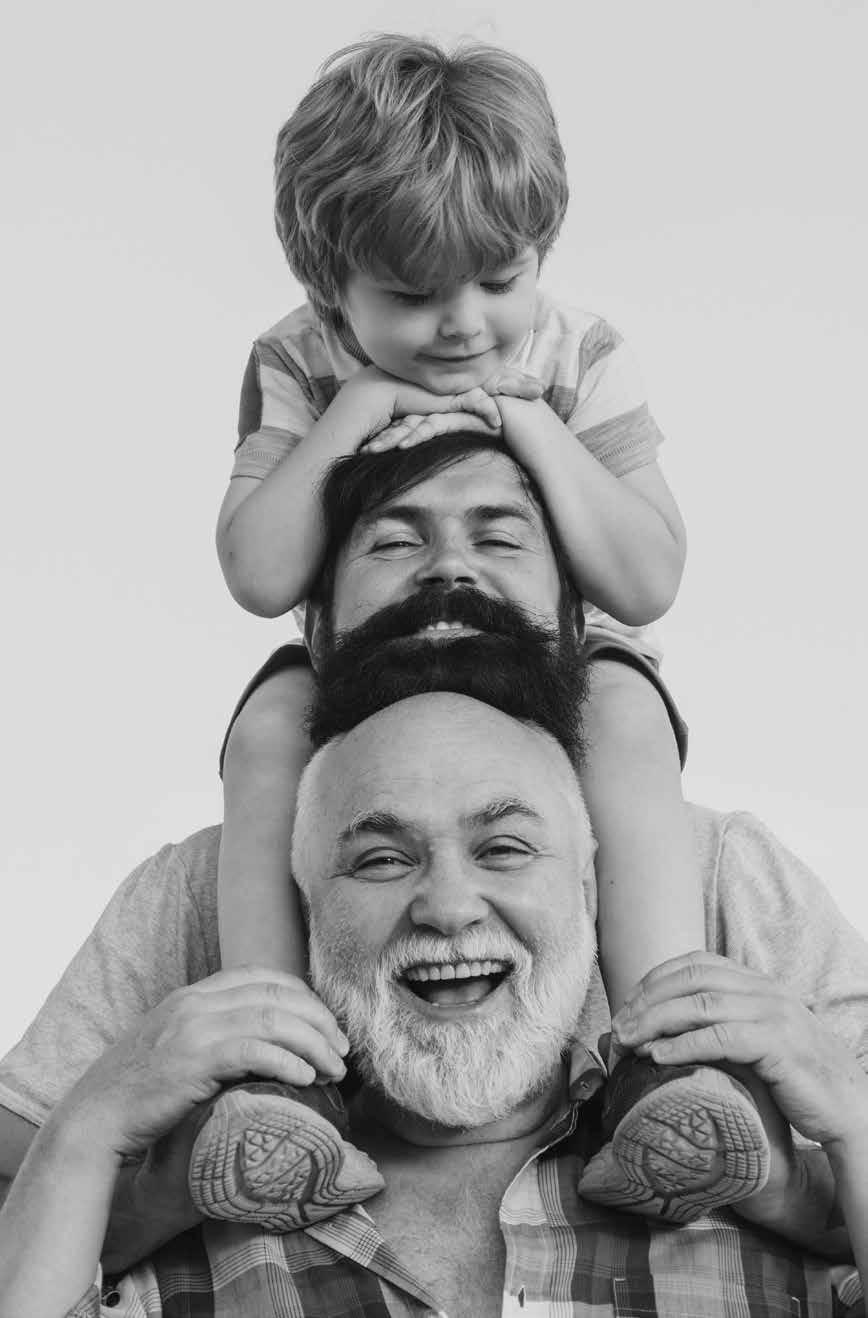
“The Lord is good to those whose hope is in him, to the one who seeks him; it is good to wait quietly for the salvation of the Lord”.
– Lamentations 3:25-26

Like you, your loved one continues to have spiritual needs. Help him or her stay engaged with church. In addition to serving spiritual needs, this can help him or her feel connected to others and remember pleasant times. It is not unusual for someone experiencing later stages of dementia to still be able to sing or respond to words like faith, love, peace, angels, etc.
• Involve your loved one in spiritual activities that he or she has known well; such as worship, Sunday School class, small groups, worship music, and praying.
• Tell folks at church if your loved one has dementia. This will help them know how to relate to your loved one.
• Have a set time at home for devotions and praying.
• Ask the pastor or an elder/deacon or an old friend from the church to visit.
• Always remember you serve a God stronger than anything. He will help you!
• Call on the church to give you respite.
• Some care recipients may want to carry their Bible throughout the day. Allow them to do so.

As a caregiver, you have extra work, struggles, and stress—but no extra time. Where do you find strength to get everything done, even with help, or to simply carry on? Begin by turning to God. “Let go and let God.” You might think you would have no trouble letting go of your difficulties—the loneliness, the fear, the feelings of abandonment, the anger, the resentment, and all the other pains. But it is hard. You want to have trust: you want to trust God. Psalm 121:2 teaches us that our strength comes from the Lord. But can He really help?
God is omnipotent. He is bigger and stronger than all your problems. Think of the parting of the Red Sea, or manna raining down from heaven, or the many miracles of Jesus. Let these acts of God build your trust in Him. Say to yourself, “God is greater than all my struggles; He gives me strength.” Trust in Him, not yourself.
“Great is our Lord and mighty in power; His understanding has no limit.” – Psalm 147:5
God is present at all times. He is with you, He knows you, and He will never leave you. Read Psalm 139. Focus on God’s intimate knowledge of you. Rest in His presence.
“God is our refuge and strength, an everpresent help in trouble.”
– Psalm 46:1
Jesus said, “And surely I am with you always, to the very end of the age.”
– Matthew 28:20
God loves you! And because He loves you, he cares for you. In a time of trouble, the Apostle Paul wrote, “...in all these things we are more than conquerors through him who loved us. For I am convinced that neither death nor life . . . nor anything else in all creation, will be able to separate us from the love of God.”
– Romans 8:37-38
Jesus calls to you, “Come to me, all you who are weary and burdened, and I will give you rest.”
– Matthew
11:28
Call out to God. Take your worries and struggles to Him. He cares for you and wants to hear from you.
“Let us then approach God’s throne of grace with confidence, so that we may receive mercy and find grace to help us in our time of need.” – Hebrews 4:16
This God will not abandon you in your difficult days of helping your loved one. God hears your cries for help. Come to Him and He will give you rest. Ask Him for courage to go on and for help. There is hope for the hopeless. Hope is the resource; hope is dynamic. Through God, our One Hope, hope can be an inner source of strength. (Learn more about NCBAM’s One Hope outreach on page 14.)

Come to Him and He will give you rest. Ask Him for courage to go on and for help. There is hope for the hopeless. Hope is the resource; hope is dynamic. Through God, our One Hope, hope can be an inner source of strength. (Learn more about NCBAM’s One Hope outreach on page 14).
Our church family is important in every aspect of our lives. Churches can play an essential role in supporting caregivers like you. Such support can reduce stress and related health problems for the caregiver and help your loved one at the same time. The church can be a source of strength and a source of spiritual and practical supports.
If you do not have a church that can help you, call the NCBAM Call Center (877.506.2226) and ask for help in locating a resource or a church that can help you.
“And we know that in all things God works for the good of those who love him, who have been called according to his purpose.”
– Romans 8:28

Churches can make a real difference to caregivers and their loved ones. But remember, you need to let them know what will truly help — and then allow them to.
• Deliver lunch or dinner.
• Run errands to pick up medications or groceries.
• Help with laundry and/or house work.
• Provide respite—in the home or in a group setting.
• Do yard work and clean out gutters.
• Build an accessibility ramp.
• Install smoke alarms and grab bars.
• Make minor home repairs.
• Provide transportation to the doctor.
• Troubleshoot computer problems.
• Pray for you and your loved one.
• Provide a ride to church.
• Provide a homebound Sunday School ministry or a small group to meet at the home.
To receive more information on NCBAM’s services or outreaches, call NCBAM at 877.506.2226.

As a ministry of Baptist Children’s Homes of North Carolina, the Mission of NCBAM is to assist adults 65+ to remain independent, and enjoy quality lives at home. Age and North Carolina residency are the only requirements for assistance. NCBAM has met needs in all 100 counties.
• NCBAM’s Call Center addresses one of the main issues seniors face: not knowing where to go for help. The Call Center is staffed with compassionate and knowledgeable specialists who connect aging adults and/or their caregivers with community resources. If no resources are available, Call Center Specialists contact local Baptist Churches to see if they can provide assistance. The Call Center is available Monday-Friday, 9am-5pm at 877.506.2226.
• Priority #1: Prevention programs focus on the key reasons aging adults lose their independence. Programs include fall and fire prevention, safe at home strategies, wheelchair ramp construction, grab bar installations, and Red Bags for medication management.
• Wise Up Enrichment Workshops NCBAM’s regional directors offer more than 40 classes addressing issues relevant to aging adults. Workshops topics include SOS for Caregivers, Caring for the Caregiver, The Five Love Languages for Caregivers, and Let’s Stop the Hurting (elder abuse prevention).
I lift my eyes to the mountains –where does my help come from? My help comes from the Lord, the Maker of heaven and earth.
– Psalm 121:1-2
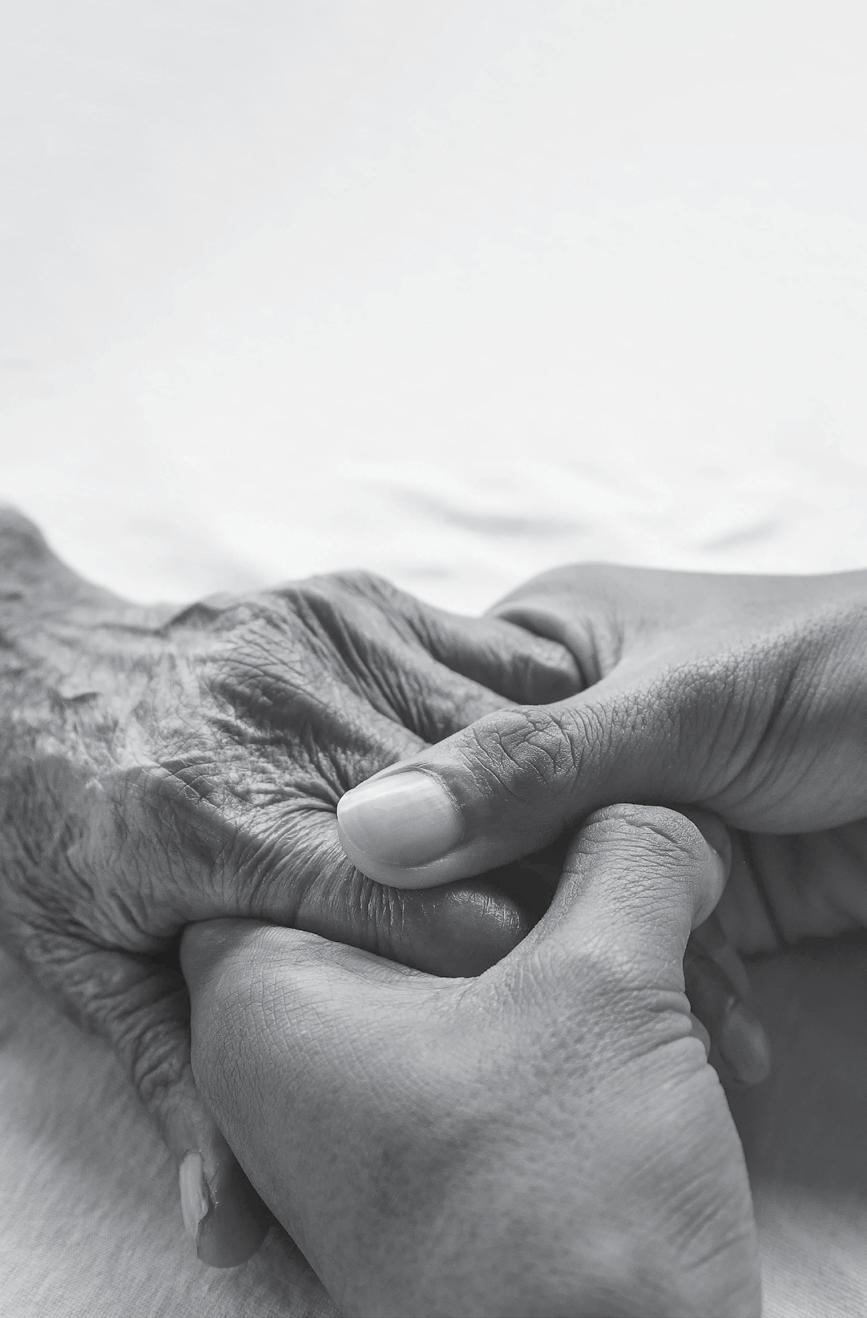
• NCBAM’s ONE HOPE outreach addresses social isolation and loneliness among senior adults and caregivers and features the NCBAM Hope Line. This friendly call service is staffed by trained staff and volunteers and is available daily, 9am-9pm. 866.578.4673
• S ervant Care offers enhanced services to retired pastors and missionaries, their spouses or surviving spouses. Benefits include assessments and regular communication from NCBAM.
• NCBAM has literature available to support the spiritual needs and give encouragement to older adults and caregivers. Some are listed below.
• ONE HOPE: 30 Daily Devotions for overcoming Loneliness
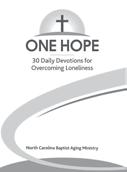
• Christ the Cornerstone brochures:
➙ 10 Passages of Promise – Biblical Truths for Aging Adults
➙ 30 Days of Strength – God’s Care, Comfort and Protection
➙ 17 Pathways to Power – Caregiver’s Prompts for Praying
➙ 10 Truths for Transformation – Biblical Encouragement for Caregivers




To receive more information on NCBAM’s services or outreaches, call NCBAM at 877.506.2226.

At the onset of dementia or disabilities (or before), it is vital to get necessary affairs and legal documents in order. If the person lacks the capacity to consent, they cannot sign the necessary documents. You want to plan for the future with help from the person. You need to review all of his or her health, legal and financial information to make sure it reflects the persons’ wishes and needs. This is an area of concern in which all immediate family needs to come together. Check to see that you have the following documents and that they are up to date:
• Durable Power of Attorney for Health Care. This document gives someone (referred to as a trustee) the power to make healthcare decisions for another person when that person is unable to do so.
• Living Will states the person’s wishes for end-of-life health care. This document spells out what medical treatment you want and do not want to be used to keep you alive.
• Do Not Resuscitate (DNR) Form tells healthcare providers how the person wants end-of-life health care managed.
• Durable Power of Attorney gives someone (a trustee) the power to make legal and financial decisions for you when you are unable to do so.

• Will tells how the person wants his or her property and money to be divided among those left behind.
• Living Trust tells someone (a trustee) how to distribute a person’s property and money.
The above forms are available at most doctors’ offices or your attorney’s office. If you need help and cannot afford an attorney, Legal Aid of NC can help you. Call Legal Aid at 866.219.5262 (LANC).

Use your cell phone to scan the QR Codes below to learn more about these caregiver resources.

The Heart of the Caregiver.
Drowning in the emotions and responsibilities of caring for someone? The Heart of the Caregiver provides emotional and spiritual support. Videos, books, and other empowering resources are available at www.theheartofthecaregiver.com.

AARP Resources for Caregivers
www.arp.org/caregiving/ or call Resource Line at 877.333.5885 for free help for individuals taking care of a loved one.

Hospice Foundation of America www.hospicefoundation.org

National Institute on Aging
www.nia.nih.gov/health/caregiving
National Council on Aging
www.ncoa.org/caregivers/benefits/ caregiver-support
Discover supportive programs that can help you better provide for your loved one and avoid burnout.
NC Lifespan Respite Program
www.ncdhhs.gov/blog/nc-lifespanrespite-program
An application-based program that reimburses eligible family caregivers caring for individuals.



NC DHHS: Family Caregiver Support
www.ncdhhs.gov/divisions/aging-and-adultservices/family-caregiver-support-program Area Agencies on Aging listings. For more information, call 919.855.3400.
Enter your zip code on the website to find a Meals on Wheels provider near you. www.mealsonwheelsamerica.org/find-meals




You are not alone! There are so many ways outlined in this book for you to connect with others who understand and can offer support and encouragement. I have led caregiver groups for more than 20 years and have seen the healing power of connection. You can do this good work that you have been called to do! NCBAM is a leader in recognizing the needs of caregivers and finding innovative and effective ways to reach out with the connection and support we all need. Take advantage of all NCBAM has to offer you today.
